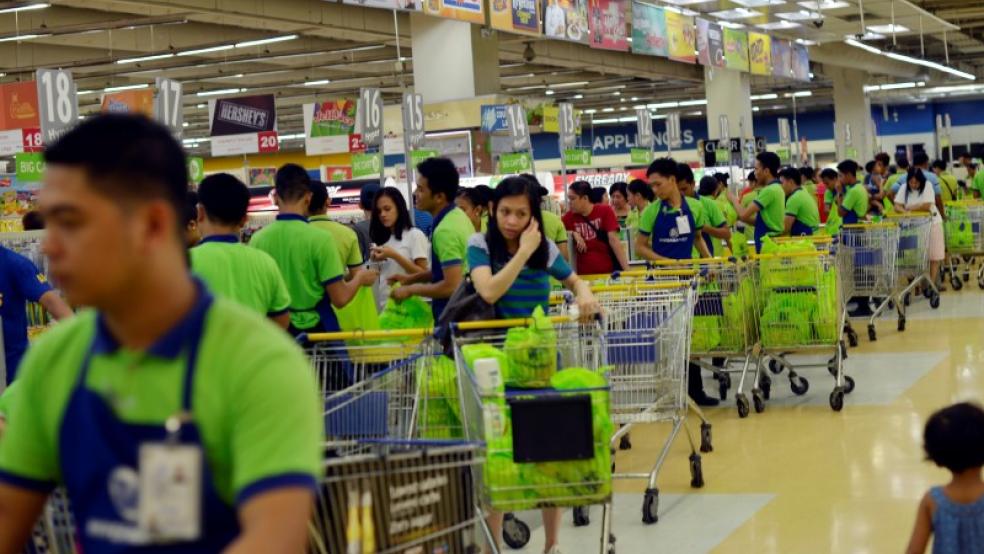WASHINGTON (Reuters) - Philippines President Rodrigo Duterte will seek billions of dollars in infrastructure investments from China in the coming months as the country seeks to alter its relationship with Beijing, Philippines Finance Minister Carlos Dominguez said on Saturday.
In an interview with Reuters, Dominguez dismissed concerns over the Philippines' investment climate raised by Duterte's blunt anti-U.S. statements and a war on drug cartels that has killed thousands.He described Duterte's recent comments telling U.S. President Barack Obama to "go to hell," as a "bump in the road" in a century-long relationship with the United States that maintains deep business and family ties. "There are headlines and there are fundamentals. The fundamentals of the Philippines are rock solid," Dominguez said on the sidelines of the International Monetary Fund and World Bank meetings here.With strong economic growth estimated by the IMF at 6.4 percent in 2016 and 6.7 percent in 2017, more foreign exchange reserves than foreign debt, strong banks and a young, relatively well-educated population, Dominguez said the Philippines was in a "golden moment" for attracting foreign direct investment.But Standard and Poor's said last month that the Philippines was unlikely to get a rating upgrade in the next two years because of Duterte's unpredictability and uncertainty over his domestic and foreign policies. Duterte's crackdown on drugs, core to a colorful election campaign likened to that of U.S. presidential candidate Donald Trump, has claimed more than 3,800 lives since his June 30 inauguration.The high toll and mysterious circumstances of many killings have alarmed rights groups, the United States and the United Nations."We believe this could undermine respect for the rule of law and human rights, through the direct challenges it presents to the legitimacy of the judiciary, media, and other democratic institutions," S&P said. On Tuesday, Duterte said Obama can "go to hell" over refused arms sales and said that one day he would "break up with America" and align the Philippines more closely with China and Russia instead.Dominguez said the U.S.-Philippines relationship remained "rock-solid" due to longstanding family and business links. "Now and then you have a spat with your partner, your friend, your wife. I think we will overcome those," Dominguez said. "It's a temporary thing, I think it's time to press the reset button here."GIVING CHINA "FACE"When Duterte visits Beijing for the first time Oct. 19-21, he will discuss the potential for Chinese investment in a new railway linking Manila with rural southern Luzon, power grids and other projects. Dominguez said these projects would cost tens of billions of dollars.The overtures will follow July's ruling by an international tribunal in The Hague, Netherlands against most of China's claims to South China Sea islands that are also claimed by the Philippines."We are going to discuss with them areas of mutual interest, but probably not enflame or not make them lose face over the arbitral decision," Dominguez said. They are still our neighbors and we still want to have good relations with them." Dominguez said that one avenue for Chinese investments could come through Beijing's new multilateral development lender, the Asian Infrastructure Investment Bank, adding that he hoped that the Philippines' parliament would ratify the country's AIIB membership in coming weeks.With the Philippines' share of infrastructure spending to gross domestic product expected to rise to over seven percent in coming years from 5.4 percent planned for next year, Dominguez said he will be "looking for the best deal.""Our plan is to split the borrowings 80 to 20 percent in favor of the domestic market," he said.Dominguez said he anticipates some capital outflows from the Philippines when the Federal Reserve resumes interest rate hikes, which many expect to begin in December. He said the country's financial system was well prepared for it, with strong, well-capitalized banks and a lot of liquidity in its markets and government coffers. (Reporting by David Lawder; Editing by Andrea Ricci)Philippines finance minister eyes Chinese investment, dismisses U.S. flap

Ezra Acayan



